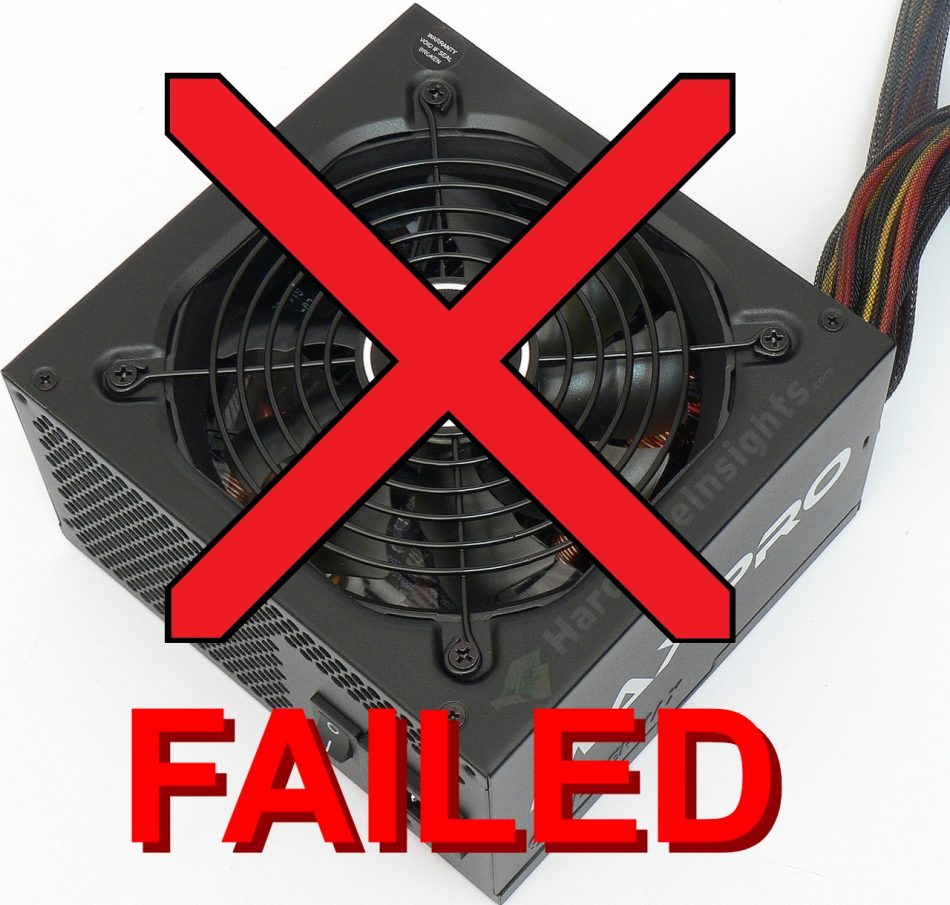Contents
- 1Introducing the Enermax MaxPro 600 W (EMP600AGT)
- 1.1Packaging and accessories
- 2Connectors & cabling
- 2.1Casing & cooling
- 3Input filtering
- 4Primary side
- 4.1+5 V stand-by rail
- 5Secondary side
- 5.1Build quality
- 6Load testing
- 6.1Loading +5 V SB
- 6.2Hold-up time
- 6.3Combined loading
- 6.4Combined loading ripple
- 6.5Crossloading, overloading
- 6.6Crossloading, overloading ripple
- 6.7Fan speed, temperatures and noise
- 7Conclusion and evaluation
- 7.1Thanks
- 7.2Discussion
Conclusion and evaluation
The Enermax MaxPro 600 W (EMP600AGT) did not pass the combined and crossload testing in accordance with the ATX specification. So according to my evaluation methodology, it is not deserving of its evaluation. I didn’t expect much for the price, though I did not expect such a disaster. Especially when the Corsair VS450 I measured years ago performed rather OK. But it is not that uncommon that lower-powered units pass loading OK, and those labeled for higher outputs do not. This may also be the case here as with the extra 150 W rating over the Cosair 450 W model, the unit has some problems under crossloading. What is strange is the fact it was in spec with an output of more than 500 W from +12 V rail (albeit just barely). But it fell out of 5% regulation with a +5 V crossload (even while drawing 75 W from +12 V at the same time). Though the -12V rail was in spec the whole time, unlike even some high-end units that go for more than twice the price.
Another problematic area is the hold-up time. Both the voltage hold-up time and power good signal hold-up time are very short. In fact, already well under the minimum values by the ATX spec. But to stay within 5% voltage regulation, the actual time the unit withstands brownout conditions is not even half (17 ms is minimum for voltage), at just 7.76 ms. That’s just disastrous. And that’s not all — with a low to medium power output, I measured incredibly high ripple from this unit. With increased output power, the ripple fell to very nice values towards the end. But this is just not acceptable, at over twice the allowed value on the minor rails, this is just too high. The very poor quality of the output capacitors is an obvious fact, and I think mentioning it is almost unneccessary. At least the protections are working so it shouldn’t explode in your face.
The efficiency is within the advertised values, but it is not that high anyway. Because of that and also the stupid design of the backside grille, the fan has to run on full speed under full load. I think that to date I’ve not seen a mainstream unit where the fan ran at full speed under full load until now. It usually took some overloading to achieve that. And even with the fan at full speed the unit runs quite hot, nevermind the noise. I guess that using a custom fan here did not help at all.
Maybe Enermax should focus the budget on different things rather than expensive fans and HeatGuard fan controllers, X-cap discharge ICs or sleeved cabling when the unit itself fails to meet the ATX spec in three different areas. And consider that CWT has in fact safely cut some corners because this unit is only meant for the 230 V grid! Even the Zalman units were not so bad, plus they offered quality capacitors while being designed to run with a 115 V input (at twice the current). The ZM600-GVM costs just some 150 CZK more at this moment. And all it takes to make it a decent unit is to add a ceramic cap to it. I don’t really see any reason to choose the Enermax MaxPro at this moment.
 Pros Pros |
+ all the cabling is sleeved + 3year warranty + working protections + HeatGuard cooling system |
 Cons Cons |
− bad capacitors − bad crossload voltage regulation − very high ripple with low loads − runs hot and loud with full load − voltage hold-up time totaly out of spec |
 Be aware of… Be aware of… |
/?\ 230V input only /?\ soldering quality |
Thanks
I thank the Enermax company for providing the Enermax MaxPro 600 W (EMP600AGT) unit.


